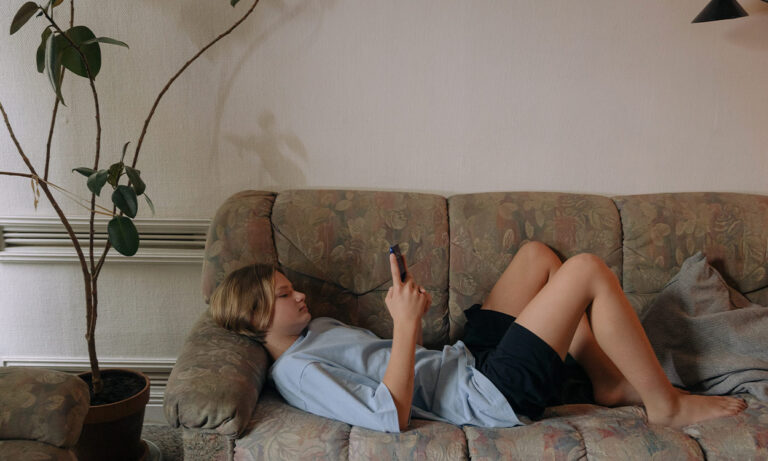Helpful tool or harmful gateway: The pros and cons of using social media for self-diagnosing
Self-diagnosing via the internet is nothing new. It seems almost second nature these days to Google physical symptoms to get a quick, digital second opinion. However, in recent years, there has also been an uptick in self-diagnosing mental health disorders through social media.
The conditions teens and young adults tend to self-diagnose include “autism, attention deficit hyperactivity disorder (ADHD), borderline personality disorder, dissociative identity disorder (DID), obsessive-compulsive disorder (OCD), and Tourette syndrome, among others,” as noted by Everyday Health. TikTok and other online platforms offer a sense of community and a starting point for those experiencing similar mental health issues, but it’s worth examining the other underlying factors at play here. So, what’s causing gen Zers to find solace in digital self-diagnosing?
First of all, it’s important to note that, according to the Centers for Disease Control and Prevention (CDC), younger generations have experienced a steep decline in mental health as a result of the pandemic. Couple that with limited access to professional mental health resources—due to a lack of health insurance or mental health stigmatisation—and it’s easy to see why gen Z is turning to TikTok for answers.
In some cases, as explained by Doctor Akua Boateng, “mental health TikToks may be the first discussions about mental health [young people are] exposed to, especially if these topics aren’t talked about at home or school.” Conversations about mental health on social media are filling gaps in care, where traditional systems and institutions are missing the mark—however, digital diagnoses can also fall short.
As you scroll through your social media platform of choice, you may come across a video from your favourite mental health influencer listing the tell-tale signs of a narcissist, and then immediately think you’re a narcissist. While your psychological experience may align with some symptoms of a mental health disorder or illness, it doesn’t automatically mean you have it. Tristan Collazo, a licensed resident in counselling, observed that “it is human nature to sometimes relate to a disorder or disease after learning a little bit about it.”
Likewise, symptoms of disorders may overlap with typical daily human experiences—what makes these traits diagnosable depends on the way they impact one’s life and their severity. Counseling Today noted that “accurately diagnosing mental health conditions is complex, requiring years of education and training to truly understand the nuances.”
Social media mental health information is helpful in spreading awareness and reducing stigma, but it’s often created for a wide, generalised audience. If you’re able to meet one-on-one with a medical professional, you can receive guidance, and possibly a treatment plan that’s curated specifically with your lived reality in mind.
Netizens should exercise caution when self-diagnosing mental health disorders as they’re often highly nuanced—a factor the internet has a habit of flattening. That being said, there can also be a wealth of benefits that come with this digital impulse. As mentioned earlier, mental health content on social media can spread awareness of medical terminology and encourage people to have a greater understanding of their personal experiences.
Licensed professional counsellor and mental health activist Lindsay Fleming mentioned that “self-diagnosing is giving people more [of an] ability to advocate for themselves and say, ‘No, I think I have this, and this is why’.” Moreover, “it’s giving people a voice within the professional world,” whether they have access to therapy or not, the expert added. This is all supplemental to the supportive community those experiencing similar symptoms can find online in addition to or in place of traditional healthcare institutions.
Similarly, self-diagnosing has been a crucial first step for many when it comes to mental health. This opinion piece by Harvard student Anuksha S. Wickramasinghe for The Harvard Crimson, for example, outlined how her own mental health journey began because of resources she found online, and how other students have had similar experiences to hers.
Jailene Ramos, a peer of Wickramasinghe, self-diagnosed prior to receiving formal ADHD and clinical depression diagnoses. She described how she “would shove it down because [she] also felt like self-diagnosing [herself] was fake.” The road to professional diagnosing is filled with complex paperwork and financial obstacles—another student, Alyx Britton, said that “it was a couple $100” to be formally evaluated for ADHD. These steps within the medical system are difficult for those who come from low-income backgrounds or atypical home environments to navigate.
Alternatively, digital diagnoses can offer internet users clarity when they may not have the resources to receive institutionalised medical help.
Like traditional diagnosing, digital self-diagnosing should take a thoughtful, nuanced approach. Otherwise, Hannah Guy, a licensed clinical social worker and certified clinical trauma professional noted that it “can lead to receiving the wrong treatment and interventions down the line.” That being said, Guy also understands that “[h]aving a diagnosis can be extremely validating for people. [While] not meeting the criteria for a diagnosis can be just as invalidating. If you’re sad. You are sad. You don’t need to be diagnosed with depression in order for your feelings of sadness to be valid.”
With Guy’s words in mind, it could be helpful to consider that self-diagnosis offers relief, but it isn’t the end of your mental health journey. Rather, internet users can use the tools available to them to remedy some of what they’re feeling. For instance, Inna Kanevsky, a TikToker and psychology professor at San Diego Community College, explained that “generally, ADHD coping strategies can be helpful for anybody. You don’t need to label yourself to use the advice.”
So, whether you don’t have access to therapy, are beginning your mental health journey online, or are anywhere in between, you can use the resources available to help you move more smoothly throughout your day. While traditional diagnoses may be ideal for some, they aren’t always available, and that’s where social media self-diagnosing can fulfil a necessary need for young people.





